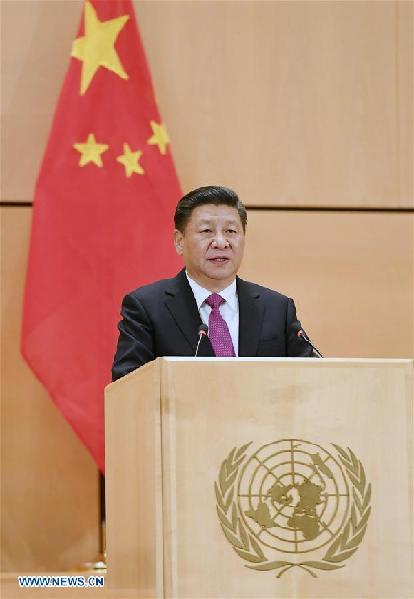Respecting diversity leads to a community of a shared future
- By Jin Liangxiang
 0 Comment(s)
0 Comment(s) Print
Print E-mail China.org.cn, November 27, 2017
E-mail China.org.cn, November 27, 2017
Chinese leaders and mainstream scholars always like to express respect for the diversity of civilizations, and mutual inclusiveness of and mutual respect for them – unlike the Western approach of sometimes seeing clashes in this regard.
|
Chinese President Xi Jinping delivers a keynote speech entitled "Work Together to Build a Community of Shared Future for Mankind" at the United Nations Office in Geneva, Switzerland, Jan. 18, 2017. [Photo/Xinhua] |
The report of the 19th CPC National Congress urged replacement of "estrangement with exchange, clashes with mutual learning, and superiority with coexistence" in handling relations among civilizations.
As has often been stressed, this approach had served to maintain China's sound relations with countries of different cultural backgrounds, and particularly those in the Islamic world, and will now serve Chinese efforts to build a community of a shared future for all humanity.
Respecting the diversity of civilizations should be universal, but what it actually means could vary in different periods of history. During Jiang Zemin's and Hu Jintao's eras, China, instressing the concept, actually meant that the West should respect other civilizations, especially that of China.
Chinese leaders would always emphasize this principle while talking with Western politicians, and would always have the saying that different development patterns and roads nations chose to follow should be respected. During those periods, China's development road was not sufficiently recognized or respected.
Recent years witnessed a tacit change. It seems that China attaches more importance to the respect for Islamic civilization, now. As is evident, China's leaders mentioned the concept mostly in meeting leaders from Islamic countries.
President Xi Jinping talked about the concept in his speech marking the opening of China-Arab Cooperation Forum in 2014. He also mentioned it during his January 2016 visit to three Middle East countries.
Islamic civilization has contributed to human development in general during a long history of interaction. Islamic civilization should always be worthy of respect, even though the Islamic world, especially Arab countries, have been frustrated in their modernization, and religious values have been frequently distorted and misinterpreted.
China has been abiding by the principle of diversity all through its history. It is out of its cultural traditions of being inclusive and tolerant, and in return, China's relations with the Islamic world have proved to be sound and this will continue.
This principle firstly has served as a cornerstone in the relations between China and Islamic countries in the era of fighting against terrorism. The West at large always blames terrorism on religion, with former U.S. President George Bush describing the American post 9/11 fight against terrorism as a "Crusade," a word with negative connotations in the Arab world.
In contrast to Western approach, China had always made some differentiation. While expressing on different occasions and at different levels that China opposes terrorism of any kind, China clearly opposes the arguments linking terrorism to a certain religion.
It is because of this differentiation that many Middle East leaders and scholars describe China is a trustworthy partner.
Respecting diversity will also serve to jointly construct the Belt and Road Initiative in the Middle East and other parts of the Islamic world.
Western researchers often pose the question in academic discussions as to how China will deal with security issues regarding the implementation of the BRI. It is reasonable they raise such questions since Many western companies and institutions are always targets of various kinds of attacks.
Though Chinese companies and institutions had not been immune to violence in the broader Middle East, generally speaking, the frequency has been much lower, considering how intensively China is involved economically in the Middle East in the last decade.
What's more, China received a lot of assistance from local people in its evacuation of Chinese personnel both in Libya and Yemen in 2011 and 2015 respectively. China also got help from a large variety of local factions in several of its efforts rescuing hostages in the last decade.
It is true there are a lot of conflicts in the Middle East, but it is also true that very few of the conflicting parties would like to take Chinese companies or institutions as targets. And they even proved to be willing to provide assistance in emergencies.
All these benign interactions could be attributed to the principle of respecting diversity. And this should be solid foundation for China to push forward Belt and Road construction jointly with Islamic countries, particularly in security cooperation.
The respect for diversity of civilizations will also serve to build a community of shared future for humanity. Different civilizations make up the colorful world, and the spirit of respecting diversity will be indispensable in building a shared community for all civilizations.
Mutual exchange and learning between the Chinese and Islamic civilizations will be of special significance. Together, they comprise a population of more than three billion, three-sevenths of the world total.
All in all, respecting the diversity of civilizations, as one characteristic of China's foreign policy, is part of a strong Chinese tradition of inclusiveness, tolerance and harmony. It not only has served to guide China's policy toward and relations with the Islamic world but also will play indispensable role in building a community of a shared future for all humanity.
Dr. Jin Liangxiang is deputy director and Senior Research Fellow with the Center for West Asian and African Studies, Shanghai Institutes for International Studies. For more information please visit:
http://m.formacion-profesional-a-distancia.com/opinion/jinliangxiang.htm
Opinion articles reflect the views of their authors, not necessarily those of China.org.cn.






